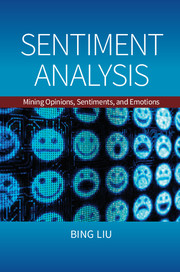Book contents
- Frontmatter
- Contents
- Preface
- Acknowledgments
- 1 Introduction
- 2 The Problem of Sentiment Analysis
- 3 Document Sentiment Classification
- 4 Sentence Subjectivity and Sentiment Classification
- 5 Aspect Sentiment Classification
- 6 Aspect and Entity Extraction
- 7 Sentiment Lexicon Generation
- 8 Analysis of Comparative Opinions
- 9 Opinion Summarization and Search
- 10 Analysis of Debates and Comments
- 11 Mining Intentions
- 12 Detecting Fake or Deceptive Opinions
- 13 Quality of Reviews
- 14 Conclusions
- Appendix
- Bibliography
- Index
5 - Aspect Sentiment Classification
Published online by Cambridge University Press: 05 June 2015
- Frontmatter
- Contents
- Preface
- Acknowledgments
- 1 Introduction
- 2 The Problem of Sentiment Analysis
- 3 Document Sentiment Classification
- 4 Sentence Subjectivity and Sentiment Classification
- 5 Aspect Sentiment Classification
- 6 Aspect and Entity Extraction
- 7 Sentiment Lexicon Generation
- 8 Analysis of Comparative Opinions
- 9 Opinion Summarization and Search
- 10 Analysis of Debates and Comments
- 11 Mining Intentions
- 12 Detecting Fake or Deceptive Opinions
- 13 Quality of Reviews
- 14 Conclusions
- Appendix
- Bibliography
- Index
Summary
Following the natural progression of chapters, this chapter should focus on expression-level (word or phrase) sentiment classification as the last two chapters were about document-level and sentence-level classifications. However, we leave that topic to Chapter 7. In this and the next chapter, we focus on aspect-based sentiment analysis (or opinion mining) to deal with the full sentiment analysis problem as defined in Section 2.1, that is, classifying sentiments and extracting sentiment or opinion targets (entities and aspects).
As we discussed in Chapters 3 and 4, classifying opinion text at the document level or at the sentence level as positive or negative is insufficient for most applications because these classifications do not identify sentiment or opinion targets or assign sentiments to the targets. Even if we know that each document evaluates a single entity, a positive opinion document about an entity does not mean that the author is positive about every aspect of the entity. Likewise, a negative opinion document does not mean that the author is negative about everything. For a more complete analysis, we need to discover aspects and determine whether the sentiment is positive, negative, or neutral about each aspect. To obtain such details, we need aspect-based sentiment analysis, which is the full model defined in Section 2.1. Aspect-based sentiment analysis was earlier called feature-based opinion mining in Hu and Liu (2004).
In the general case (Definition 2.1 in Section 2.1.1), an opinion is defined as a quadruple (g, s, h, t), where g is the opinion target, s is the sentiment on the target, h is the opinion holder, and t is the time when the opinion is given. However, in many cases, it is useful to decompose an opinion target to an entity and one of its aspects. This gives the quintuple definition of (e, a, s, h, t), where e is an entity and a is one of its aspects (Definition 2.7 in Section 2.1.4).
- Type
- Chapter
- Information
- Sentiment AnalysisMining Opinions, Sentiments, and Emotions, pp. 90 - 136Publisher: Cambridge University PressPrint publication year: 2015
- 1
- Cited by



